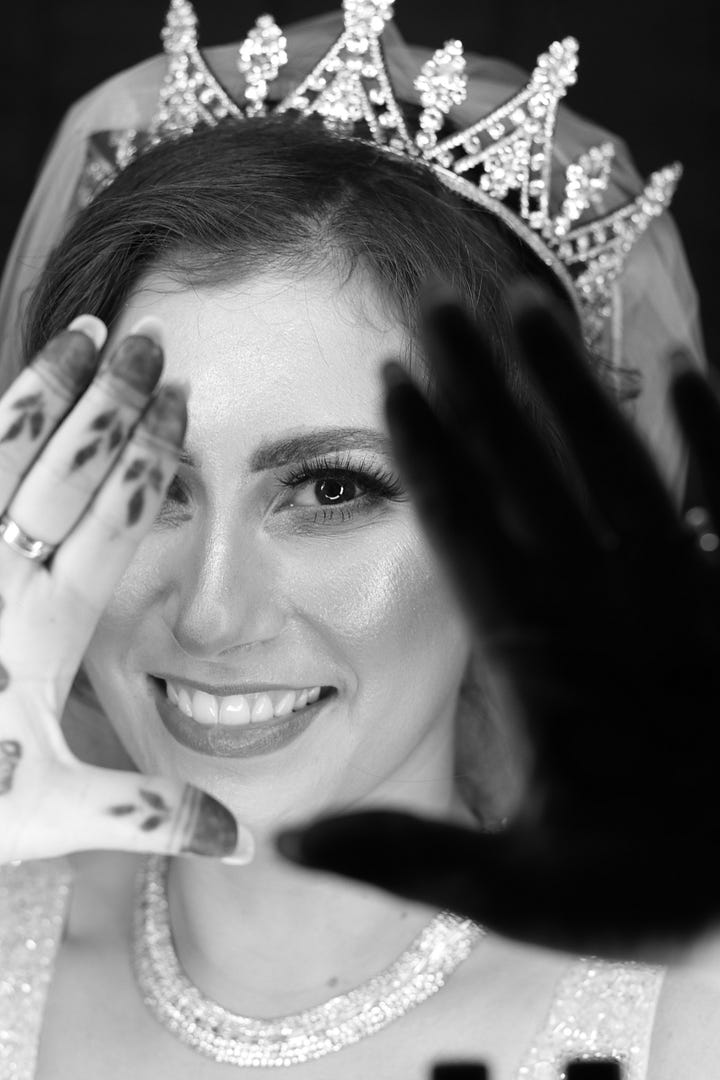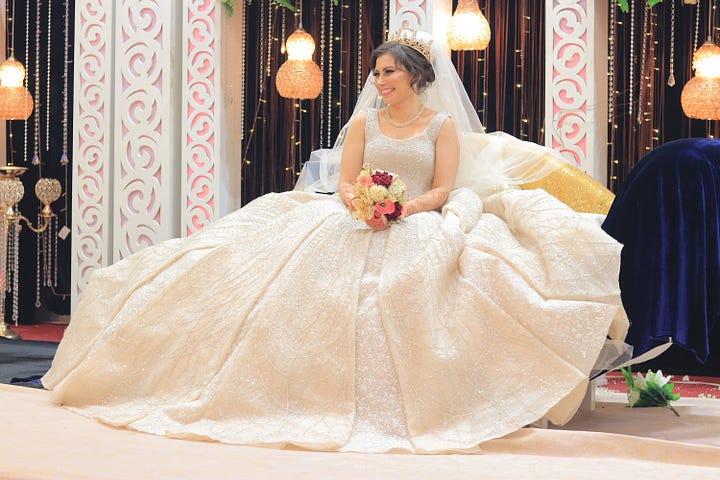The Market and the Dress
That afternoon, we were going to the market to buy everything we needed for Eid al-Fitr, the celebration at the end of Ramadan. I was also going to see my wedding dress for the first time. Biko and I were in Yemen to celebrate our wedding with his family and there was so much to do before the big day. We had talked a lot about the dress before the trip and I thought renting it in Aden was the best option. It was a practical decision, I wouldn’t have to carry a wedding dress in my luggage on a two-day trip, with multiple layovers, and a night at an airport hotel. But more importantly, it was a way to make sure my dress followed the Adeni wedding fashion trends. Yemeni women don’t share photos publicly, and I had no way to know what a bride would or should look like. I knew, however, that anything I brought with me from the U.S. would be too simple for the hundreds of eyes that would be scrutinizing the foreign bride. We didn’t have much time and I trusted that my sisters-in-law would find the right dress before I arrived.
Biko volunteered to drive us so he could show me more of the city. My sisters-in-law and nephew insisted I take the front seat. It was my second day in Aden and there was still so much to see. “That’s my school. That’s my friend’s house. That’s where we used to get ice cream when we were kids,” Biko would point through the half-open car window in a fruitless attempt to get some outside fresh air.
We got off at a side street and Biko drove away. It was a narrow street and the shade from the high buildings made it feel a little cooler than in the rest of the city. As we walked up our hidden street, I could see the wide avenue we were heading to. There were lots of families rushing to do their Eid al-Fitr shopping. We got to the intersection, turned left, and entered the main avenue leaving the shelter of the cool shade behind. The area was closed to traffic and the street vendors multiplied the offer from the stores by selling shoes, clothes, and accessories on the sidewalk. It was not an unfamiliar scene. It reminded me of the markets in Flores in the city of Buenos Aires, where I had ventured a few times to buy clothes with my college friends.
My attention shifted from the stores to the people, and I realized that different from the market in Buenos Aires, my sisters-in-law were wearing black abayas and burkas, covering their bodies and faces like 99% of the women around us. I got scared for a second. “What if I get lost? How would I recognize them?” In that moment of fear, I pictured myself lost in Aden, not able to speak Arabic or use my cell phone, which had no service in Yemen. It didn’t occur to me that they would recognize me, that the market was only four streets long, and that I could always go back to where the car had left us. Our meeting point. The only thing I could think of was the turquoise T-shirt Biko’s nephew was wearing. It would be easy to spot in case of emergency. My lighthouse in the sea of black abayas.
Fixated on the turquoise T-shirt, my eyes forgot about the market until we got to the big glass door of a two-story mall. Wedding dresses, wedding shoes, wedding decorations. The mall was entirely dedicated to wedding shopping. Contrary to the busy avenue, there were no people, and I remembered my brother-in-law trying to convince me not to go to Yemen in the summer. Couples choose to get married in the fall or the spring, not in June when the heat is unbearable and there’s limited access to air conditioning.
The escalators were not working, and we walked up to the second floor. Aden has a few hours of electricity a day and yes, stores have generators, but the priority is always the lights and the fridges. Everything else becomes a luxury. I wondered whether the escalators were not working because of a power cut, or if they were permanently out of service. But I was too lost in my own thoughts, and I didn’t ask.
On the second floor, we entered the store right in front of the escalators. The dresses took up most of the space, and it was difficult to move without bumping into something. There was a short exchange in Arabic between my sister-in-law and the man in charge of the store. He opened his way through the crowd of embroidered fabrics and left to a back room. My eyes tried to absorb every detail on every dress. Most of them were white, and all of them were astonishing, covered in sparkling beads or embroideries.
The man came back and addressed me for the first time. “Arusa, dress”. He said mixing both languages and waited for my reaction.
I knew arusa meant bride. I understood what he was saying. But I was taken aback by the dress he had carefully placed in front of me and I couldn't respond. It was beautiful. Gorgeous. It was heavy, big, and sparkly. Not even close to my style. But, why not? It was a dress that I would never choose to wear in Argentina. And yet, at that moment, I wished the wedding was that day so I could just put it on and walk out of the store turned into a bride.
I tried to make sense of my contradictory emotions. “I love this dress, but I can never wear something like this in Argentina. We’re not in Argentina, though. Aren’t these dresses only for movies or magazines? It’s like a fairy tale dress, I didn’t think they were real. Such a beautiful fabric. It must be difficult to walk in this dress, but I think it’s worth it. I don’t think I’ll have the chance to wear a dress like this ever again.”
I wasn’t scared anymore when we stepped out to the main avenue. From the black abayas and the turquoise T-shirt, now I could only think about the dress and my inner contradiction between simplicity and glamour. I grew up in a country where being glamorous and extravagant was frowned upon, especially if you were a woman. Neat and well put together, but not too much makeup. Nice clothes, but not too much color or sparkle. Always look perfect, but don’t be ostentatious. Don’t show off. Would I be showing off with this dress?
I want to believe that people are less judgmental now. But I hadn’t really thought about Argentina’s censoring gaze on women until that day, on the other side of the world, in a country where women are believed to be oppressed. Without knowing it, two young women in abayas and burkas helped me confront the censoring gaze I grew up with. “Do you like it? Are you happy?” They were asking me if I wanted to wear the beautiful heavy sparkling dress, and the answer was yes. Not to follow the wedding fashion trends of the Yemeni society, as I had thought. But to own the way I would look on my wedding day, for myself and no one else.


Thank you for reading me!
Until the next story.
Pia
If you’ve enjoyed this post, you can share it with others who you think might enjoy it too.
If you haven’t subscribed yet, and would like to read more about my trip to Yemen, you can subscribe below. I share a new story every other weekend.



